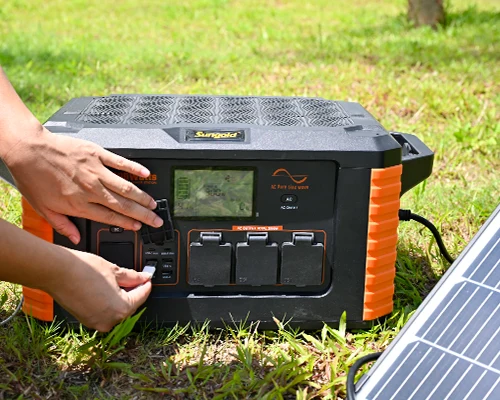When we break away from urban life and step into the arms of nature, camping becomes a great way to explore the unknown, wander through the serenity, and feel free.
But even in the most wild lands, having some basic electricity can take our camping game to the next level. Whether it’s charging your smartphone, lighting up your tent at night, or keeping your food and drinks cool, electricity is a must-have for modern camping. In this article, we’ll dive into 3 ways to make your camping with electricity even at off-grid campsites.
What to consider when thinking about electricity for camping
Consider the following key questions when purchasing equipment or systems that will allow you to use electricity while camping:
What do you use electricity for?
What devices will you need to use or charge? If you only plan to use your cell phone and pad, you won’t need a very powerful power source. However, if you like to take photographs while traveling, and you may need to transfer all the photos you take during the day to your computer and charge your camera battery at night, then you’ll need slightly more powerful devices. If you want to enhance your comfort experience, it is perfectly fine to use more powerful devices such as refrigerators, fans, and kettles. These devices can bring more convenience and comfort to your life.
Start by listing the devices you plan to take with you, including their power needs in terms of voltage, amperage, and wattage. Doing so will help you determine how much power you need to generate or store.
How long is your camping trip?
Next, consider how long you will be camping. If it’s just a weekend trip, you’ll need to bring electrical equipment that has a small capacity or generating capacity. If it’s a long trip of several weeks, the power needs may be a bit greater, and you need to be aware of this when choosing your charging options.
Does the campground have electricity?
The type of camping also affects your power needs. For example, if you are camping in a campground with electrical outlets, you may not need to bring any additional power. However, if you are camping in a remote area without electrical outlets, you will need to plan for a backup power source.
If you are car camping, the weight and portability of the power supply may not be as important. Still, if you are backpacking, weight and portability will be an important consideration.
What is your budget?
Finally, consider your budget. The price points of the centralized power supplies we’re going to mention next vary widely, so you can weigh your decision based on your specific needs and actual budget.
If you’ve thought through all of the above we can begin to understand the different power options when camping. Let’s get started!
Portable Solar Charger
I love some national parks just because I can experience both camping and hiking before reaching my destination, I can enjoy the natural scenery along the way, there are times when I don’t want to bring my camera, I will just bring my cell phone and use it for taking pictures, but it drains the battery quickly and I have to have a power source for my phone, I usually bring a rechargeable charger, but lately I have discovered the extra fun- a portable solar charger. —Portable solar charger. The good thing about it is that I can hang it on my backpack, and when I walk under the sunlight it will capture the sunlight and convert it into electricity to charge my cell phone…amazing right, I can’t get enough of it.
My portable solar charger has two USB ports just right for charging my cell phone. There are metal hooks around it, which makes it hang securely on my backpack, and when I don’t use it, I can fold it up, and I’ll put it in my backpack when I’m done storing it, which is very convenient. Although he is only 30w, it is still sufficient as a temporary power supplement for camping.
Pros
- Lightweight and portable
- Convenient and quick charging
- Power on the go
- Affordable price
Cons
- Low power generation
- Short endurance

Camping Solar Panel
Portable solar panels are a camping power option for many people because they are lightweight and easy to carry yet meet basic power needs, and they can charge cell phones, tablets, fans, and other electronic devices. Simple to install, absorbs sunlight and then converted to current, and then stored in a portable power station, environmentally friendly and quiet can be used for a long time and many times, used to give short trips to charge very suitable.
I recently bought Sungold’s 135w solar panel for camping SPC from a camping equipment store, and it’s very light in hand, about 7 pounds, about the same as my 15-inch laptop. I use it to charge my cell phone and PC, generating enough power daily to charge small electronic devices. The solar panel doesn’t charge electronics directly, but it’s nice to have it supplement my power station, and I’m thinking about getting a higher-wattage solar panel to charge my RV.
Pros
- Lightweight and portable
- clean and quiet
- safety and eco-friendly
- affordable price
Cons
- Cannot charge high-power devices
- Cannot be charged directly
- Restricted by weather

Gas Generators
Unlike solar energy, which is dependent on the weather, gas generators are much more stable and can power more and more powerful devices, including cooking appliances and even large devices such as air conditioners and water heaters. However, they can be heavy, noisy, and require fuel to operate. They’re not the most environmentally friendly option, and the noise generated when generating electricity can be a nuisance to you and your camping neighbors.
Pros:
- Reliable
- Can power a variety of devices, even larger ones
- Affordable
Cons:
- Heavy
- Noisy
- Requires fuel

Features to Consider When Buying Electricity for Camping
By considering these features, you can choose the type of power that best suits your camping needs.
Power Output
The power output is the amount of energy that the device can provide. This is important because different devices require different amounts of power. Make sure that the power output of your chosen power supply is sufficient for your needs. As mentioned above, if you make a list of devices that need to be charged while camping, it should give you a good idea of the power output needed for your adventure.
Portability and Ease of Use
The portability of your equipment is important because you need equipment that is easy to carry and transport. Therefore, consider the weight, size, and ease of use of your equipment before you buy it. This is especially important if you are a backpacker. Similarly, consider the ease of use of the product.
I would not use a gas generator for a number of reasons, even when car camping, noise being one of them. However, one of the main reasons is that they are bulky and I find it a pain to install and transport them, even from the car to the campsite. Larger solar panels can also be a hassle to install and remove, as some of them are heavier and bulkier, but I have found that they are not as bulky as gas generators.
Rechargeability
Rechargeable devices (such as portable mobile power or power stations) are more convenient and environmentally friendly than gas generators. When a gas generator runs out of fuel, you’ll need to replenish it, but with a portable power source, you can easily recharge it through solar panels or your car’s charging port. When choosing a power source, consider charging time and charging method (solar, AC wall outlet, etc.).
Durability
Durability is another important consideration when using your gear for outdoor activities. If you’re camping in rough terrain or inclement weather, you’ll need equipment that can handle the elements. Look for equipment that can withstand harsh conditions. Sungold Solar is a good brand, I bought my solar panels from a dealer back in ’20 and they are still good as new after close to 4 years of use.
Compatibility
Make sure the device you choose is compatible with the equipment you need to power.
If you’re camping for an extended period and need to charge your laptop, you’ll need to make sure you have a power station or mobile power source that is compatible with the type of plug your laptop uses.
Fuel
Consider the source of electricity you use. Most power stations or rechargeables can be powered by solar panels, which is a great way to camp. However, if solar power is the only way you’re charging your devices (direct solar power, no rechargeable batteries or charging stations), then this method of charging may be less reliable, as the sun doesn’t always power solar panels. If you’re using a gas generator, you’ll need to consider carrying enough fuel to power your devices for the duration of your trip.
Conclusion
With advances in portable power solutions, camping with electricity is more convenient and sustainable than ever. Whether you choose a lightweight solar charger for daytime hikes, a rugged solar panel unit for longer stays, or even a gas generator for high power needs, the key is to choose a solution that matches your camping style, budget, and power needs.
Portable solar units like the Sungold Solar provide an eco-friendly, quiet way to charge your equipment, enhancing your camping experience without the bulk and noise of a traditional gas generator. Choose the right power source and get ready to experience the best of both worlds on your next outdoor adventure.
FAQ: Electricity and Power Solutions for Camping
1. How do you get electricity while camping?
You can obtain electricity while camping through various methods, including:
- Portable Power Stations: These are battery-operated devices that can power small electronics.
- Solar Panels: Setting up solar panels can provide renewable energy, especially during sunny days.
- Generators: Gas or propane generators can supply power but can be noisy and require fuel.
- Camping with Hookups: Some campgrounds offer electrical hookups for RVs and trailers.
2. How big of a battery do I need for camping?
The size of the battery needed depends on your power requirements. Here’s a simple guide:
- For Light Use (charging phones, LED lights): A 200-300Wh battery is sufficient.
- For Moderate Use (small appliances, laptops): Look for a 500-1000Wh battery.
- For Heavy Use (fridges, multiple devices): A battery of 1000Wh or more may be necessary.
3. Is it worth getting a portable power station?
Yes, a portable power station can be worth the investment if:
- You require a reliable power source for multiple devices.
- You enjoy activities like camping, tailgating, or outdoor events.
- You want a quiet, emissions-free option compared to traditional generators.
4. What is the best battery for long-term camping?
For long-term camping, lithium-ion batteries are often the best choice due to:
- Longevity: They can last for several years with proper care.
- Lightweight: Easier to transport compared to lead-acid batteries.
- Efficiency: They have a higher depth of discharge and can be charged faster.











